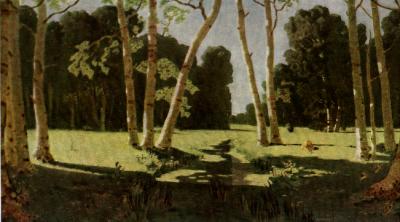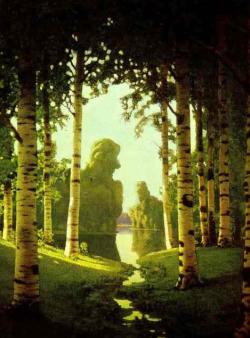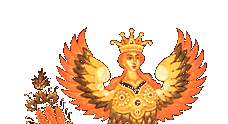 The Russian landscape painter Arkhip Ivanovich Kuinji was born in 1842 in the
town of Mariupol on the Azov Sea in the South of Russia. Kuinji was of
a Greek descent - during the reign of Catherine II his ancestors, together
with other Greek refugees, settled near the Azov Sea.
Kuinji lacked formal education, but his eminent gift helped him attain
a notable success in art. He evidently was allowed to attend classes at
the St. Petersburg Academy of Arts, had training in the workshop of the
famous in Russia marine painter Ivan Aivazovsky, visited the classes of
the Society of Art Lovers. In 1868,
having passed exams in general education and special subjects at the Academy
of Arts, Kuinji received a diploma of a freelance artist for his independent
work. His earlier paintings Autumn Weather (1870), Lake
Ladoga (1870) and On the Valaam Island (1873)
brought him first recognition.
In 1873 Kuinji traveled around Germany, France, Switzerland and Austria
and thoroughly studied the works of great masters. On his return, however,
he creates works which were absolutely unlike those he had seen in European
museums.
His Ukrainian Night (1876) opened
a new romantic stage in his work. He used special light effects to paint
the nature and achieved such astonishing results, that people, who saw
the picture for the first time at the exhibition, tried to check its back,
if there was any special source of light. Exhibited at the Paris World
Fair in 1878 The Ukranian Night attracted the attention of the eminent
French critics.
Kuinji developed a new vision in his next painting A
Birch Grove (1879). Nature in it is both realistic and conventionalized;
it looks as a condensed essence of reality. In 1880 he completed Moonlit
Night on Dnieper (1880). The picture was a great success. Kuinji
became an idol of the public. But he was not understood by his colleagues
who saw in his art only illusory color effects, did not support his romantic
searching. Probably it was the reason of his withdrawal from all
exhibitions and public arrangements. He worked hard in his studio, experimenting
much, but only his close friends saw his works.
In 1894 he accepted an invitation to become a professor of the Academy.
He was very fond of teaching and his students admired him. Among Kuinji?s
pupils were several prominent artists such as N. Rerikh, K. Bogaevskiy,
A. Rilov, V. Purvit and others. Unfortunately his career of a professor
did not last long, he was dismissed for supporting students in their protests
against authorities. But he continued to teach his students privately,
and then paid for their trip around Europe. Later he presented the Academy
with a big sum of money, the interest from which was to be used for awards
to young painters.
In 1909 he founded The Kuinji Society, an independent association
of painters, to which he left all his pictures and property. The next year
he died.
The other well-known works of Kuinji are A
Birch Grove (1879),
The Russian landscape painter Arkhip Ivanovich Kuinji was born in 1842 in the
town of Mariupol on the Azov Sea in the South of Russia. Kuinji was of
a Greek descent - during the reign of Catherine II his ancestors, together
with other Greek refugees, settled near the Azov Sea.
Kuinji lacked formal education, but his eminent gift helped him attain
a notable success in art. He evidently was allowed to attend classes at
the St. Petersburg Academy of Arts, had training in the workshop of the
famous in Russia marine painter Ivan Aivazovsky, visited the classes of
the Society of Art Lovers. In 1868,
having passed exams in general education and special subjects at the Academy
of Arts, Kuinji received a diploma of a freelance artist for his independent
work. His earlier paintings Autumn Weather (1870), Lake
Ladoga (1870) and On the Valaam Island (1873)
brought him first recognition.
In 1873 Kuinji traveled around Germany, France, Switzerland and Austria
and thoroughly studied the works of great masters. On his return, however,
he creates works which were absolutely unlike those he had seen in European
museums.
His Ukrainian Night (1876) opened
a new romantic stage in his work. He used special light effects to paint
the nature and achieved such astonishing results, that people, who saw
the picture for the first time at the exhibition, tried to check its back,
if there was any special source of light. Exhibited at the Paris World
Fair in 1878 The Ukranian Night attracted the attention of the eminent
French critics.
Kuinji developed a new vision in his next painting A
Birch Grove (1879). Nature in it is both realistic and conventionalized;
it looks as a condensed essence of reality. In 1880 he completed Moonlit
Night on Dnieper (1880). The picture was a great success. Kuinji
became an idol of the public. But he was not understood by his colleagues
who saw in his art only illusory color effects, did not support his romantic
searching. Probably it was the reason of his withdrawal from all
exhibitions and public arrangements. He worked hard in his studio, experimenting
much, but only his close friends saw his works.
In 1894 he accepted an invitation to become a professor of the Academy.
He was very fond of teaching and his students admired him. Among Kuinji?s
pupils were several prominent artists such as N. Rerikh, K. Bogaevskiy,
A. Rilov, V. Purvit and others. Unfortunately his career of a professor
did not last long, he was dismissed for supporting students in their protests
against authorities. But he continued to teach his students privately,
and then paid for their trip around Europe. Later he presented the Academy
with a big sum of money, the interest from which was to be used for awards
to young painters.
In 1909 he founded The Kuinji Society, an independent association
of painters, to which he left all his pictures and property. The next year
he died.
The other well-known works of Kuinji are A
Birch Grove (1879),
 with one of its late versions A
Birch Grove (1901),
with one of its late versions A
Birch Grove (1901),
 The North
(1879), After a Rain (1879),
Sea. The Crimea. (1898-1908),
Elbrus in the Evening. (1898-1908),
Sunset (1890-1895), Rainbow (1900-1905),
Night
Grazing (1905-1908).
The North
(1879), After a Rain (1879),
Sea. The Crimea. (1898-1908),
Elbrus in the Evening. (1898-1908),
Sunset (1890-1895), Rainbow (1900-1905),
Night
Grazing (1905-1908).
|



